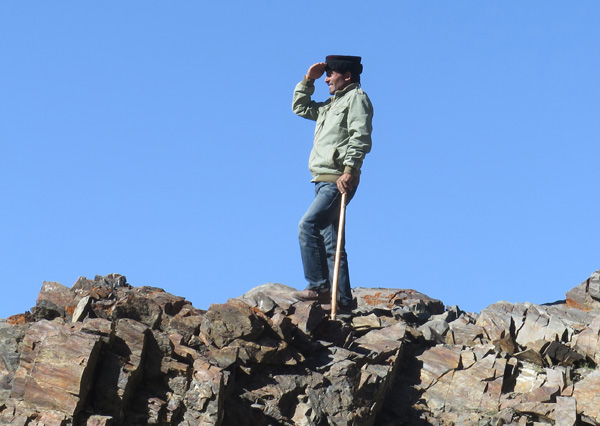 |
|
A Tajik herdsman helps troops patrol an area along the border. The Tajik people play an important role in providing valuable information about suspicious activities. CUI JIA/CHINA DAILY |
Traveling westward from the outpost along the valley and almost reaching the border between China and Afghanistan lies Keketuluke, which means "where flowers blossom" in Tajik. But with snow and rocky mountains in the high altitude all year long, the idea of seeing flowers blossom in this area is only a dream.
The troops based there have to bear the harsh environment and try to make the most out of being in a no man's land, said Wang Lie, a political instructor of the battalion in charge of the Wakhan Corridor-based companies.
"A soldier there once asked me if he could have a few days off because he wanted to see a tree," said Wang, 37, who has been serving in the corridor for 18 years.
His skin has become extremely tan after working on the Pamir Plateau, where ultraviolet radiation from the sun is very strong. The PLA has developed a special sunscreen lotion for troops based on high plateau areas. Wang said it works wonders in protecting skin, but getting tanned cannot be prevented.
A barbed wire fence appeared after another 20 km west of Keketuluke. The fence separates China and Afghanistan amid the 92 km border area.
"Although the border between the two countries is not long, separatist extremists and terrorists always attempt to penetrate China through it," Wang said.
Border protection
The Wakhan Corridor was a peaceful area until war broke out in Afghanistan following the Sept 11, 2001, attacks in the US. It has since begun to draw international attention, and the PLA has tightened its border control.
In 2012, a Tajik herdsman informed the troops that suspicious people were spotted at the valley. Soldiers later caught five men who had planned to go to Afghanistan to participate in jihad, or holy war, Wang said.
Some Tajiks have moved to the corridor in the summer for their sheep and yak to graze on the rich grassland. Every time a PLA vehicle drove past the valley, they all came out of their yurts and waved to the soldiers.
"We cannot guard the border without the Tajik herdsmen. We hire their yaks to patrol in the winter and they become our guides. They also provide valuable information about suspicious activities when they graze their sheep," Wang said.
"We are proud to help the soldiers because they are here to protect us," said Wutkar Ablas, 45, who has been herding in the Wakhan Corridor for 20 years.
Wutkar's family is one of the 20 households of Tajik herdsmen in the corridor.
